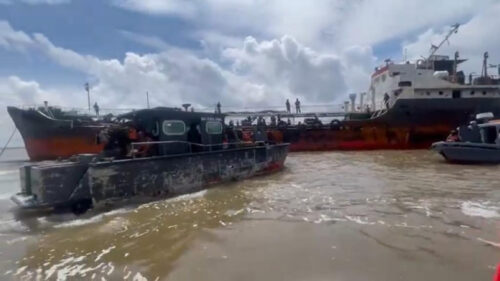
THE ROLE OF LAW IN RESTORING INVESTORS’ CONFIDENCE IN THE NIGERIAN MINING INDUSTRY
July 16, 2025
A REVIEW OF THE LAW AND ACCEPTABLE PROCEDURES OF CHILD ADOPTION AND GUARDIANSHIP
July 16, 2025Ship Arrest Nigeria
Introduction
Ship arrest is a crucial legal tool in maritime law which is frequently employed to enforce claims against a vessel. It involves a ship being temporarily detained by a court order, usually to enforce a judgement or guarantee the satisfaction of a claim. All parties involved in the maritime industry—shipowners, operators, insurers, legal experts, and maritime authorities— must comprehend the legal viewpoints surrounding ship arrest as well as the more general topic of maritime safety. The legal framework pertaining to ship arrest, the situations in which it takes place, and the consequences for maritime safety will all be covered in this article.
What Is Ship Arrest?
In order to secure a claim, such as unpaid debts, damages, or other maritime disputes, the authorities of a maritime nation may detain a vessel through a legal process known as “ship arrest.” In order to ensure that the defendant cannot move the ship in order to avoid legal action, ship arrest is a crucial tool in maritime law. International agreements like the 1999 International Convention on Arrest of Ships and national maritime laws of individual nations provide the legal basis for ship arrests.
A ship may be detained in a port or harbor for a variety of reasons, such as unpaid ship maintenance bills, crew wages, salvage, collisions, or environmental infractions.
Ship Arrest: What is It? Through the legal procedure known as “ship arrest,” a claimant asks the court to hold a vessel in order to establish a maritime claim. In the event that the claim is upheld or the defendant—typically the shipowner—fails to satisfy the judgement, this guarantees the claimant some sort of security against the vessel. Admiralty courts, which deal with matters pertaining to shipping, marine insurance, cargo disputes, and other maritime matters, are usually where ship arrests take place. International conventions and national laws both serve as guidelines for the practice of ship arrests. In this context, one of the most important international legal frameworks is the International convention on ship arrest which was adopted under the auspices of the United Nations.
The United Nations sponsored the adoption of the 1999 Convention on the Arrest of Ships. A uniform process for ship arrests in member states is provided by the convention. This convention helps to standardize the legal approach to ship arrest across jurisdictions, even though each country has its own set of rules and regulations. Ship Arrest Grounds There are several reasons why a vessel could be arrested. Claims pertaining to maritime operations usually give rise to these explanation including:
- Nonpayment of debts: Creditors may attempt to seize the ship in order to collect unpaid bills if the shipowner does not pay for services like port fees, fuel, or repairs.
- Cargo claims: In an effort to obtain restitution for their losses, cargo owners may attempt to have the vessel arrested if their cargo is delayed, damaged, or lost.
- Marine Insurance Claims: If the shipowner violates the terms of their marine insurance policy, they may be arrested in order to ensure payment.
- Personal injury or death: A vessel may be arrested in response to claims involving seafarers or passengers, frequently brought on by carelessness or hazardous working conditions.
- Environmental claims: In order to guarantee reimbursement for environmental harm, ships that pollute the environment or break environmental laws may be detained.
Procedures for Ship Arrest
Under the Law Different jurisdictions may have different ship arrest procedures. Nonetheless, the majority of legal systems share a few characteristics:
- Filing a Claim: The claimant must establish the existence of a legitimate maritime claim and file a claim in an admiralty court in order to start a ship arrest.
- Arrest Request : The claimant may ask for the vessel to be arrested if the court determines that there is enough evidence. Details regarding the claim, the vessel, and the grounds for the arrest must all be included in this request.
- Issuance of the Arrest Order: The court will issue an arrest order if it determines that there is a valid claim. In certain situations, the claimant might be required to furnish a security bond or guarantee in the event that the arrest is later found to be unwarranted.
- Enforcement: Until the disagreement is settled or the debt is settled, the ship will be held, typically by port authorities or a bailiff appointed by the court. The ship is unable to leave port during this time, which can cause the shipowner to suffer large financial losses.
- Ship Release: If the claim is paid or appropriate security is provided, the ship may be released. The ship can resume its journey if the case is settled.
The Legal Perspective Of Ship Arrest In Nigeria.
Nigeria has a thorough legal system that includes numerous important laws and rules that control ship arrest and maritime safety.
Legal Views on Nigerian Ship Arrests: In Nigeria, ship arrest is a legal tool used to protect maritime claims and guarantee adherence to maritime duties.
The main laws that control ship arrest are as follows:
- The 2007 Merchant Shipping Act: By outlining ship registration procedures, safety requirements, and liabilities resulting from maritime incidents, this Act establishes the fundamental legal framework for maritime operations in Nigeria.
- Nigerian Maritime Administration and Safety Agency (NIMASA) Act 2007: This Act establishes NIMASA and requires the agency to oversee maritime safety, security, and regulatory compliance; it plays a crucial role in enforcing standards and detaining vessels that violate regulations.
- Admiralty Jurisdiction Act FN 2004: This Act grants the Federal High Court exclusive jurisdiction over admiralty matters, including ship arrests, meaning that maritime disputes are decided by a specialized judicial body.
- The 2003 Coastal and Inland Shipping (Cabotage) Act: In an effort to encourage indigenous involvement in maritime commerce, this Act limits domestic coastal trade to vessels flying the Nigerian flag. It also establishes grounds for the arrest of vessels that violate its provisions.
Nigerian maritime safety is regulated by a mix of national and international laws designed to protect people and property while at sea. Important legal tools consist of:
- The 1974 International Convention for the Safety of Life at Sea (SOLAS): SOLAS, which was incorporated into Nigerian law by the Merchant Shipping Act of 2007, establishes extensive safety requirements for the design, functionality, and maintenance of ships. It is considered a crime to violate SOLAS regulations.
- The 1972 Convention on the International Regulations for Preventing Collisions at Sea (COLREGS): The Merchant Shipping (Collision) Rules 2010, which are also incorporated into Nigerian law, provide navigational guidelines to reduce ship collisions and improve maritime safety.
In addition to incorporating international conventions, the Merchant Shipping Act of 2007 addresses a number of maritime safety and liability issues by outlining particular provisions for cargo claims, passenger claims, and marine casualties.
Arresting a vessel usually entails submitting an ex-parte application for an arrest warrant along with an action in rem to the Federal High Court. The plaintiff has to make sure the ship is in Nigerian territorial waters or is anticipated to arrive soon. Since noncompliance may result in liability for wrongful arrest, it is required to search the caveat register prior to the arrest in order to look for any existing caveats against arrest. The Admiralty Marshal makes the arrest after the warrant is issued, and the ship is held until a court order releases it or it is sold to pay off a judgement.
Nigeria’s maritime industry still faces difficulties in spite of this strong legal framework, especially with regard to the application of safety rules. For example, incidents like the recent boat capsize on the River Niger, which claimed a large number of lives, bring to light problems with vessel overloading and insufficient safety precautions. These tragedies highlight the necessity of strict enforcement of current legislation and ongoing stakeholder education regarding maritime safety procedures.
Summarily, even though Nigeria has comprehensive laws pertaining to ship arrest and maritime safety, protecting people and property in its maritime domain depends on these laws being effectively enforced and adhering to.

Implications For Maritime Safety
Consequences for Safety at Sea Ship arrest has significant ramifications for maritime safety even though it is essential for settling financial disputes and safeguarding the interests of creditors. Safety for the crew and the larger maritime community may occasionally be directly impacted by a vessel’s arrest.
- Safety and Delays Issues: Schedules for maintenance, inspections, and operations may be delayed if a vessel is detained for arrest and remains in port for an extended amount of time. Safety concerns may result from this, especially if the vessel is not kept in good condition while being held. Long-term delays may also wear out the crew, which could result in safety violations.
- Effect on the Crew Well-being: The living conditions and morale of the crew may be impacted by a ship’s arrest. For instance, seafarers may experience stress and anxiety if they are left stranded in foreign ports with little money. Safety hazards may also arise from the uncertainty surrounding their employment’s future, especially when it comes to adhering to international labour standards.
- Environmental Safety: A vessel that is being detained may occasionally be the subject of environmental lawsuits. An increased risk of pollution could arise from worsening conditions if the vessel is kept in port for a long time. Furthermore, the ship might not have the facilities or resources needed to maintain appropriate environmental protections.
- Legal Implications for Safety Regulations: The ship may be the subject of additional maritime authorities’ inspections while it is under ship arrest. The vessel may be subject to further legal repercussions, such as fines, penalties, or a prohibition from operating, if any safety violations or regulatory infractions are found.

Conclusion
In order to protect creditors’ rights and stop the unjust disappearance of assets, ship arrest is a crucial tool under maritime law. But even though its legal processes are essential for upholding maritime rights, they may have unforeseen.
A key element of maritime law is the arrest of ships, which provides a way to protect legal claims and guarantee that those engaged in maritime disputes are held responsible. To prevent detrimental effects on the environment, crew, and ship’s safety, it must be handled carefully. Ship arrest laws aim to strike a balance between upholding legal rights and safeguarding maritime commerce. Stakeholders in the shipping industry must comprehend how legal proceedings and maritime safety intersect as global trade grows. Maintaining a stable and secure global maritime environment requires strict adherence to maritime safety regulations and effective legal oversight.
REFERENCE
- United Nations, International Convention on Arrest of Ships, 1999. Available: https://www.un.org/depts/los/convention_agreements/texts/arrest_ships_1999.p df
- United Nations, Convention on the Recognition and Enforcement of Foreign Arbitral Awards, 1958. Available: https://www.uncitral.org/pdf/english/texts /arbitration/NY-~anv/XXII_1_e.pdf
- Lloyd’s List, Ship Arrests Report. Available: https://www.lloydslist.com
- Admiralty Court Procedures, Ship Arrest in the UK. Available: https://www.judiciary.uk
International Maritime Organization (IMO), CLC 1992. Available: https://www.imo.org
ABOUT THE AUTHOR:

Okpa Ruth Samaro Esq, is a legal research and associate in the banking & finance and debt recovery practice groups. She regularly advises on maritime claim and white collar crimes.
CLICK ON THE LINK BELOW TO DOWNLOAD THIS ARTICLE:
THE LEGAL PERPECTIVES OF SHIP ARREST AND MARITIME SAFETY copy

